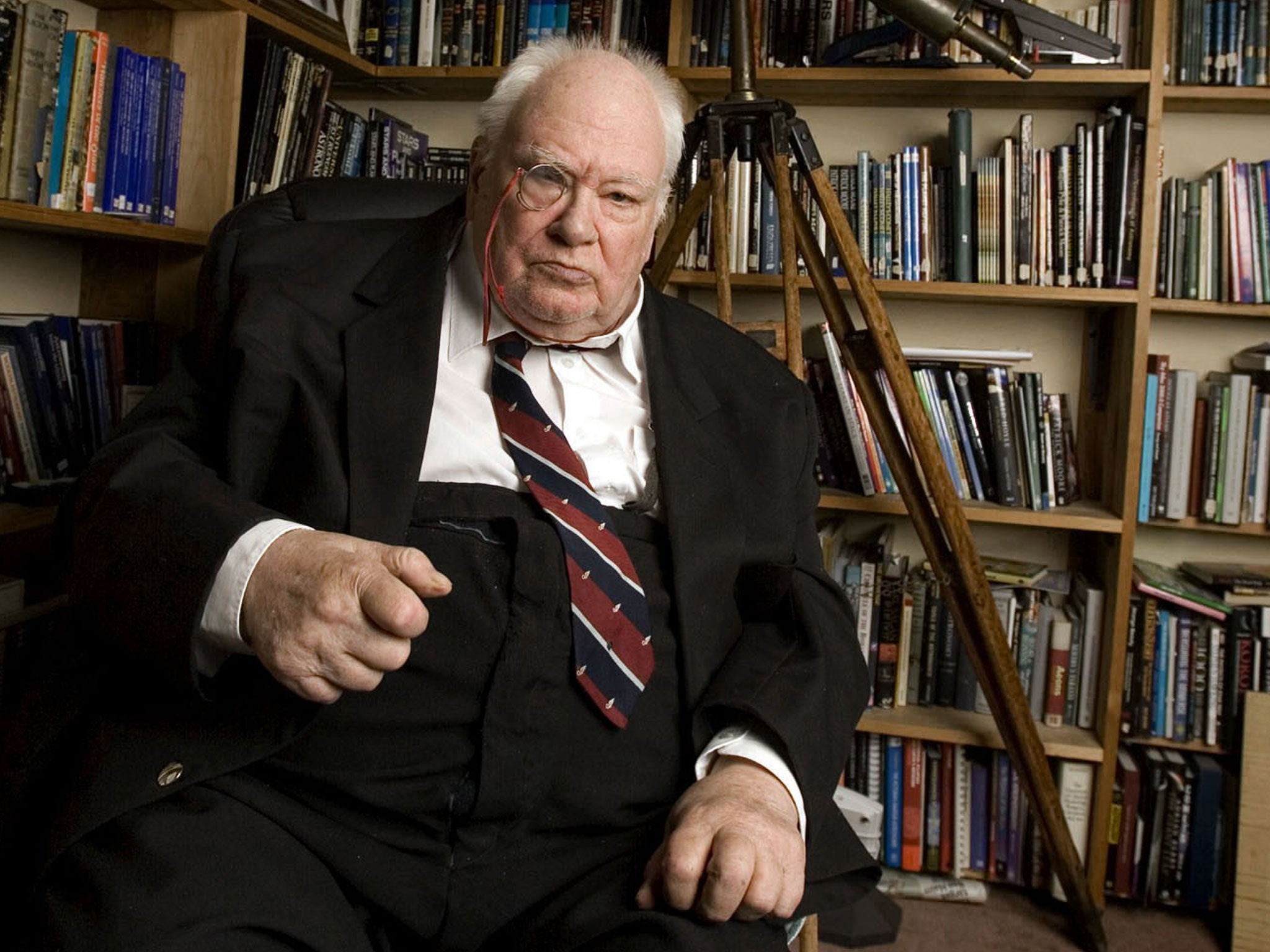IoS TV review: The Sky at Night, BBC4, Thursday Stargazing Live, BBC2, Tuesday, Wednesday, Thursday Spies of Warsaw, BBC4, Wednesday
The late Sir Patrick Moore says a last farewell as novice astronomers rustle around in his garden

Your support helps us to tell the story
From reproductive rights to climate change to Big Tech, The Independent is on the ground when the story is developing. Whether it's investigating the financials of Elon Musk's pro-Trump PAC or producing our latest documentary, 'The A Word', which shines a light on the American women fighting for reproductive rights, we know how important it is to parse out the facts from the messaging.
At such a critical moment in US history, we need reporters on the ground. Your donation allows us to keep sending journalists to speak to both sides of the story.
The Independent is trusted by Americans across the entire political spectrum. And unlike many other quality news outlets, we choose not to lock Americans out of our reporting and analysis with paywalls. We believe quality journalism should be available to everyone, paid for by those who can afford it.
Your support makes all the difference.Stargazing Live may have dominated BBC2's firmament last week, but last Thursday marked the final appearance of a more weighty heavenly body.
Patrick Moore first appeared on The Sky at Night in 1957, and, before his death last month, he was able to introduce and sign off last week's edition, his final contribution to the show that streaked across the late-night schedules like a slightly barmy comet. His last broadcast words were sweet. "Next month, we'll be talking about the Sun and those lovely things the Moon and the southern lights," he said, his bushy gaze daring the viewer, as ever, not to tune in. "Thank you very much, good night."
Before that, there was the familiar, welcome mix of amateur enthusiasm and expert analysis. The latter centred on a discussion of a new planet, "just 4.5 light years away", which apparently makes it our nearest neighbour. However, it was made clear that it would take "tens of thousands of years" to pop round for a cup of sugar and, in any case, there'd be no one in because Alpha Centauri Bb is a fiery furnace of hell-fire and brimstone.
Previously, a group of beginner- astronomers were invited to Patrick Moore's back garden to be shown how to get to grips with their new telescopes. One couple hadn't yet managed to get it out of its cardboard box. Three professional astronomers were on hand to advise, calibrate and encourage, and I'm sure would-be Galileos were enlightened. The rest of us didn't need any sort of optical enhancement to enjoy this particular spectacle: the British amateur fettling and fiddling to the unmistakable accompaniment of rustling anorak and murmurs of mild disappointment.
There was disappointment, too, on Stargazing Live – I caught two of the three evenings, and on Tuesday and Thursday spent quite a lot of time looking at an overcast night sky as various astronomical wheezes fell victim to the seasonal weather. Back in the studio, though, Stargazing Live was a triumph.
This is the third series, and it showed: co-presenters Dara O'Briain and Brian Cox batted gags and astro factoids to and fro with ease, knowing when to let guest boffins light the afterburners and when to bring them down to Earth. The formula was simple: a magaziney mix of chats with eggheads, pre-recorded items and live feeds from Nasa HQ and beyond (not, sadly, from space).
Most fun was the half-hour studio chat, in which the show's various guests – including Queen guitarist and astrophysicist Brian May, looking like a permed Gandalf – had a drink and, helpfully, mulled over the previous hour's revelations. (For some reason this chat wasn't tacked on to the end but scheduled as a separate programme altogether, Stargazing Live: Back to Earth.)
Manned missions to Mars, the likelihood of our annihilation by a giant asteroid, and the slightly icky-sounding Panspermia theory of life were all discussed. At one point, we even got to witness Brian Cox's famous capacity for awe, live, as he goggled at a test-tube of space dust older than the solar system and let O'Briain get on with the more tedious job of presenting.
On BBC4, there was a salutary lesson in how not to handle a star. Spies of Warsaw is an adaptation of Alan Furst's novel, in which David Tennant plays a French spy on the Polish border with Germany in the run-up to the Second World War. Colonel Mercier, it would seem, is discreet, stoical, a stone-cold killer – and not exactly Tennant, let's face it. As he rescues Russian emigrés, beats up Nazis and breaks ladies' hearts, Tennant just looked sadder and sadder, more aware than anyone that he's no bed-hopping action hero.

Watch Apple TV+ free for 7 days
New subscribers only. £8.99/mo. after free trial. Plan auto-renews until cancelled

Watch Apple TV+ free for 7 days
New subscribers only. £8.99/mo. after free trial. Plan auto-renews until cancelled
Of course, it could be that we were meant to regard such passages as interludes in the drama's serious business – that of considering the plight of all those caught up in the turmoil of late-Thirties central Europe. Well, perhaps.
If that was the case then Dick Clement and Ian La Frenais might have done us the courtesy of a script as jazzy as the soundtrack. Instead, the cast mooned around the streets and salons of Warsaw trying to get the most out of lines such as: "Does anyone listen to the League of Nations now Mussolini's pulled out?"
Tennant was bundled into the boot of a Gestapo car at the close of last week's episode. If he's got any sense, he'll try to stay there.
Join our commenting forum
Join thought-provoking conversations, follow other Independent readers and see their replies
Comments